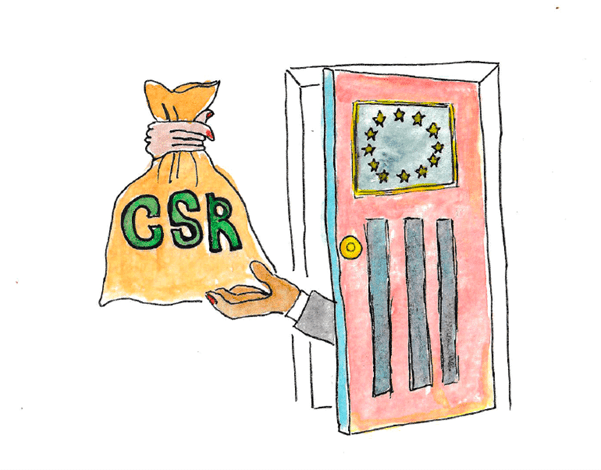
Public policies (increasingly) affect firm activities and outcomes, making governments one of their most critical audiences. To influence public policies, firms first need to gain access to political actors, which is subject to their ability to supply something relevant and important to those political actors, the so-called ‘access good’ (or price of access). In this paper, published in Journal of Management Studies, I examine what kind of access good corporate social responsibility (CSR) is, how it is constructed, and how access is negotiated.
DISCURSIVE INSTITUTIONALISM. I start by arguing that we should understand CSR as an idea: a normative and changing belief about how firms should give meaning to their impact on society and the environment. I explain how the meaning of CSR is constantly refined, reframed, and reinterpreted as actors talk with each other. Firms, policymakers, and other actors have different – but co-existing – understandings of what CSR is, based on their perceived interests. Similarly, I argue that access should also be understood as a fluid idea and firms can negotiate their terms. This focus on ideas and discursive interactions is what we call a ‘discursive institutionalist view’.
CONTEXT. My study focusses on the empirical case of the European Union (EU), particularly the (executive) Commission and the (elected) Parliament. Actors working in these EU institutions need information and legitimacy to function successfully. To study CSR as an access good, I conducted 43 interviews with EU Commission officials, Euro-parliamentarians, and a range of external stakeholders, including nongovernmental organizations (NGOs). I also attended 10 key events organized by EU institutions and industry actors, as well as gathering all publicly available policy documents both on CSR and lobbying. I then make sense of all these data by finding patterns between CSR and political access.
FINDINGS. Across all interviews and events, I found that the notion of CSR was highly contested as political actors questioned both the legitimacy and value of CSR. One Commission official, for example, said: “I am always a bit worried by companies that have a CSR commitment because I know, from my experience, that they can say about everything [about CSR] and mostly it is just a lot of reporting.” Indeed, political actors were concerned about greenwashing and corporate misconduct, such as the Rana Plaza disaster in 2013 or the 2015 Volkswagen emission scandal. This finding was puzzling: if CSR is contested, then how can it be valuable for firms’ political access? I found four discursive strategies through how political actors (re)shaped CSR’s meaning and acted upon the CSR controversy:
- KEEPING CSR CONTESTED. A first group of political actors – Commission officials working on files with limited relevance to firms – kept the value of CSR contested by discursively echoing the prevailing greenwashing criticisms. As a result, these political actors focussed on their legislative autonomy and had very limited interactions with firms or NGOs.
- SIDING WITH NGOS. A second group of political actors – Euro-parliamentarians – used the CSR contestation to discursively situate CSR as inherently problematic. However, as they were still making policies on firm issues, they depend upon firms to deliver relevant information. To navigate this, they adopted a ‘double-edged strategy’; although publicly criticizing firms, they privately interacted in small round-table settings with those firms that had successfully partnered with NGOs.
- REPLACING CSR WITH CORPORATE SUSTAINABILITY. A third group of political actors – Commissioners’ cabinet members – accepted CSR as contested but replaced it with the notion of ‘corporate sustainability’. Corporate sustainability seemed to offer a new, untainted concept and provided opportunities for political actors to expand their reach. As a result, firms having (and sharing) operational experience on the strategic implementation of sustainability within their core business model were invited to speak at EU conferences and had access to more private dialogues.
- REDEFINING CSR’S PARAMETERS. A fourth group of political actors – Commission Directive General (DG) officials – discursively de-contested CSR by refining its parameters. Specifically, political actors asserted that there are objective ways to measure and verify CSR’s credibility. As a result, firms communicating ‘positive CSR data’ were in the driving seat during policy discussions in EU projects and platforms.
CONCLUSION. By conceptualizing CSR as an idea rather than a material reality, it becomes clear how the concept is embedded in actors’ perceived interests and co-constructed through repeated discursive interactions. The prevalence of certain CSR ideas has political performative consequences in terms of when and how firms gain political access. Like CSR ideas, the terms of access are flexible and subjected to constant negotiations.
TIPS FOR PUBLIC AFFAIRS MANAGERS. As a starting point, you can think about how to (re)construct your idea of what CSR means in a way that fits political actors’ understanding. Next, reflect on how you can tailor your political strategies to different political institutions. This includes understanding how you act and perform different roles based on the political demand. In addition, knowing that the terms of access are negotiable, you can start thinking creatively about how you can discursively shape the boundary conditions of access related to when, how, and what access you desire.

0 Comments